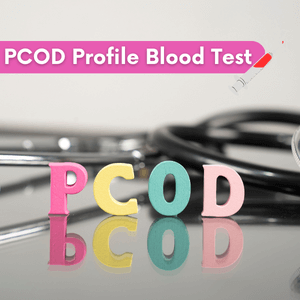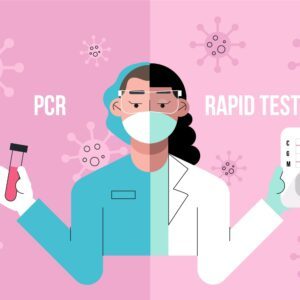Polycystic Ovarian Disease (PCOD) affects 5-10% of women of reproductive age, typically discovered when they face difficulties getting pregnant in their 20s and 30s.
It is caused by issues with androgens, estrogens, and gonadotropins, which can lead to infertility and hyperandrogenism. If left untreated, it can result in lifelong severe conditions like ovarian cancer, coronary artery disease, diabetes, and more.
Therefore, seeking treatment for PCOS as soon as possible is essential.
What is a PCOD Profile Test?
PCOD – Polycystic Ovary Disorder – is a test to assess functions and levels of various hormones in women. Polycystic Ovarian Disease occurs when the ovaries produce large amounts of immature eggs. Over time, it turns into cysts in the ovaries. These cause ovaries to produce huge amounts of androgens (male hormones) and become enlarged, leading to problems such as abnormal weight gain, irregular menstrual cycle, etc., making it harder to get pregnant and causing infertility. However, it can be managed and controlled by changing diet and lifestyle.Comprehensive PCOD Profile Test List
The list of PCOD profile tests is as follows:- Luteinizing Hormone (LH)
- Follicle Stimulating Hormone (FSH)
- Prolactin (PRL)
- Thyroid Stimulating Hormone (TSH)
- Testosterone
- Insulin – fasting
- DHEA – S
- Complete Hemogram (28)
- Diabetic Screen (2)
-
- HbA1c
- Average blood glucose
-
How is the PCOD Profile Test Done?
The PCOD (Polycystic Ovary Syndrome) profile is tested to identify and treat PCOD. Several blood tests and ultrasound imaging are used in the test to evaluate the hormonal and physical condition of the ovaries. Here are the steps involved in the PCOD profile test:
- Blood tests: The doctor will recommend blood tests to evaluate the levels of hormones such as testosterone, LH, FSH, estrogen, prolactin, and TSH.
- Glucose tolerance test: This test measures how well the body metabolizes glucose and helps to identify insulin resistance.
- Lipid profile: The lipid profile test checks for cholesterol and triglyceride levels in the blood.
- Ultrasound Imaging: This test examines the ovaries and checks for the presence of cysts.
- Other tests: The doctor may suggest further tests, including a pelvic examination, hysterosalpingogram (HSG), or laparoscopy, based on the unique circumstances of the individual being evaluated.
In conclusion, the PCOD profile exam provides a thorough assessment of the ovaries’ hormonal and physical health that aids in diagnosing and treating PCOD.
FAQs
- How much does the PCOD profile blood test cost?






Reviews
There are no reviews yet.